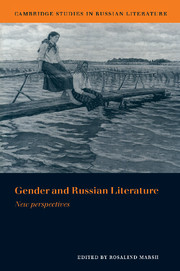Book contents
- Frontmatter
- Contents
- Notes on contributors
- Acknowledgements
- 1 Introduction: new perspectives on women and gender in Russian literature
- PART I HISTORICAL AND BIOGRAPHICAL PERSPECTIVES
- 2 Women in seventeenth-century Russian literature
- 3 Conflicts over gender and status in early nineteenth-century Russian literature: the case of Anna Bunina and her poem Padenie Faetona
- 4 Reading the future: women and fortune-telling in Russia (1770–1840)
- 5 Russian women writers of the nineteenth century
- 6 The ‘woman question’ of the 1860s, and the ambiguity of the ‘learned woman’
- 7 Carving out a career: women prose writers, 1885–1917, the biographical background
- 8 The fate of women writers in literature at the beginning of the twentieth century: ‘A. Mirè’, Anna Mar, Lidiia Zinov′eva-Annibal
- 9 Lidiia Zinov′eva-Annibal's The Singing Ass: a woman's view of men and Eros
- 10 Anastasiia Verbitskaia reconsidered
- 11 Soviet woman of the 1980s: self-portrait in poetry
- PART II THE PERSPECTIVE OF LITERARY CRITICISM
- Index
- CAMBRIDGE STUDIES IN RUSSIAN LITERATURE
2 - Women in seventeenth-century Russian literature
Published online by Cambridge University Press: 06 July 2010
- Frontmatter
- Contents
- Notes on contributors
- Acknowledgements
- 1 Introduction: new perspectives on women and gender in Russian literature
- PART I HISTORICAL AND BIOGRAPHICAL PERSPECTIVES
- 2 Women in seventeenth-century Russian literature
- 3 Conflicts over gender and status in early nineteenth-century Russian literature: the case of Anna Bunina and her poem Padenie Faetona
- 4 Reading the future: women and fortune-telling in Russia (1770–1840)
- 5 Russian women writers of the nineteenth century
- 6 The ‘woman question’ of the 1860s, and the ambiguity of the ‘learned woman’
- 7 Carving out a career: women prose writers, 1885–1917, the biographical background
- 8 The fate of women writers in literature at the beginning of the twentieth century: ‘A. Mirè’, Anna Mar, Lidiia Zinov′eva-Annibal
- 9 Lidiia Zinov′eva-Annibal's The Singing Ass: a woman's view of men and Eros
- 10 Anastasiia Verbitskaia reconsidered
- 11 Soviet woman of the 1980s: self-portrait in poetry
- PART II THE PERSPECTIVE OF LITERARY CRITICISM
- Index
- CAMBRIDGE STUDIES IN RUSSIAN LITERATURE
Summary
The seventeenth century is generally accepted as a period of major transition in the history of Russia: the ‘Time of Troubles’ (1598–1613) eventually gave way to the dynastic continuity of the Romanovs; invasion and civil war were ended when Muscovy gathered up the reins of political centralization and power, becoming at last the undisputed capital of all Russia; and the Orthodox Church suffered many decades of heretical dissent from splintering factions before the great Schism of the second half of the century left it scarred forever. In cultural fields it was a time of transference of ecclesiastical pre-eminence to secular, and the transition from medieval to modern began in earnest. This was a period of much uncertainty and introspection, yet also of great literary innovation and creativity, and specifically, a period when the image of woman in literature underwent radical transformations which not only significantly advanced her own status, but also produced pioneering literary works, challenging accepted generic and ideological conventions.
The parameters of this essay have necessarily been limited, as space, unfortunately, does not permit detailed analysis of all areas and aspects of literature. Therefore the main focus will be upon native Russian works, wholly independent of or minimally influenced by the translated literature from Poland, Czechoslovakia and France which was beginning to appear in Russia, especially in the second half of the century. The female role in folk and oral traditions is far too extensive to approach here, but will be referred to when required.
- Type
- Chapter
- Information
- Gender and Russian LiteratureNew Perspectives, pp. 41 - 54Publisher: Cambridge University PressPrint publication year: 1996

